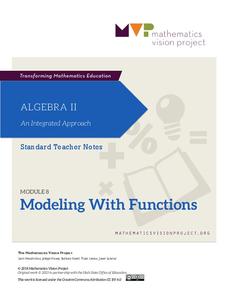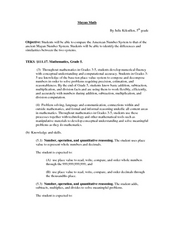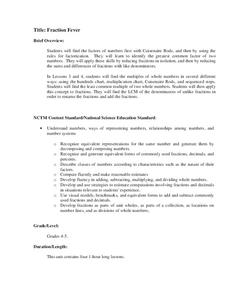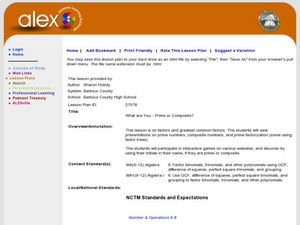Curated OER
Developing Strategies for Addition and Subtraction
Primary graders develop strategies to assist them with addition and subtraction. They discover number combinations and numerical facts which enable them to add and subtract more effectively. Students use these techniques to complete...
Mathematics Vision Project
Module 8: Modeling With Functions
Sometimes there just isn't a parent function that fits the situation. Help scholars learn to combine function types through operations and compositions. Learners first explore a new concept with an introductory activity and then follow...
Curated OER
Mayan Math
Fifth graders investigate the Maya's as mathematicians. In this Mayan math lessons, 5th graders work with the ancient Mayan numbering system by comparing it to the American Number System. They tell the differences and similarities...
Curated OER
Multiplying Polynomials
Students explore the concept of multiplying polynomials. In this multiplying polynomials lesson plan, students watch a video clip about basic math skills. Students work in groups on an exploration about why a binomial squared equals a...
Curated OER
Organic and Inorganic Waste
Students conduct a scientific investigation about organic or inorganic waste. For this organic or inorganic waste lesson, students create a compost heap to determine the difference between inorganic and organic waste. Students record...
Curated OER
Scenario Challenge
Students create a quilt, using different patterns. In this geometry instructional activity, students apply prior knowledge as they use different patterns to help them create a quilt using transformations and geometric shapes.
Curated OER
Plunge Into Place Value
Students use expanded notation. In this mathematics lesson, students determine the place value of a digit within a whole number. Students use manipulatives, words, and symbols to represent whole numbers.
Curated OER
Native American Pebble and Pot Game
Students participate in a game using 12 manipulatives. In this addition and subtraction lesson students play a game originated by the Native Americans and look at a number of items and calculate how many are hidden. Items looked at and...
Curated OER
Food Pyramid Power: Looking Back and Moving Forward
Students show their knowledge of properties of objects as it pertains to sorting and creating patterns. In this food pyramid power lesson plan, students show their ability to use whole numbers in different representations by appling...
ISTE
Macaroni Math - Unit Overview
It's not just for lunch, mini mathematicians make use of macaroni to model addition and subtraction of numbers up to 10. They place macaroni pieces on their desk and take away to model subtraction, then write subtraction story problems....
Granite School District
Kindergarten CCSS Math Vocabulary Word List
Help kindergartners develop the academic language they need to master the Common Core standards with this list of math vocabulary. Including the definitions of each term as well as a set of word cards with supporting images and examples,...
Virginia Department of Education
Photosynthesis and Cellular Respiration
Provide high schoolers with their own indoor gardens! Emerging scientists discuss the process of photosynthesis and germinate seeds before growing plants in multiple lighting conditions. The hands-on application allows pupils to see...
National Park Service
Reduce Our Carbon Footprint, Let’s Compost!
Roll up your sleeves and get a little dirty with this elementary and middle school compost lesson. All you need is a large plastic container, a couple old newspapers, some organic waste, and a few hundred worms and you're ready to start...
Normal Community High School
Classification of Matter
Steel is an example of homogeneous mixture, also called an alloy, which is made of iron and carbon. The presentation introduces learners to elements, compounds, and mixtures. They explore their similarities and differences, and then take...
Curated OER
Lead and Mercury Ion Catalase Inhibition
Students participate in a laboratory investigation in which they observe the effect of temperature and pH on enzyme activity. Students also examine exposure to heavy metal ions and the effect that may have on enzyme activity.
Curated OER
Smart Cookie Factors
Learners examine the concept of finding the greatest common factor. They complete number of activities as they practice identifying prime and composite numbers. Pupils apply rules of divisibility and find the greatest common factor while...
Curated OER
Two-Digit Subtraction With and Without Regrouping
Second graders subtract two-digit numbers. In this mathematics lesson, 2nd graders subtract both with and without regrouping. Students use manipulatives and place value mats to assist in problem solving.
National Security Agency
Fraction Fever
This unit on fractions allows for upper-aged elementary learners to explore ways to find the greatest common factor and least common multiple of two numbers. Ultimately, young mathematicians will be able to identify equivalent fractions,...
It's About Time
Elements and Compounds
Young scientists use electrolysis to separate water into its elements before experimenting with fire to learn about their properties. A helpful resource provides a reading passage and analysis questions.
Teach Engineering
DNA Forensics and Color Pigments
Use food coloring in electrophoresis. The last segment in a four-part series mimics DNA fingerprinting by using chromatography. Teams conduct chromatography on food coloring to find colors that use similar pigmentation in their makeup.
Chicago Botanic Garden
Leaf Litter Ecology Lab
Some organisms spend their entire lives in leaf litter. The third in a series of six is a great lesson exploring the community of leaf litter. Groups gather and then spread leaf litter over white paper and remove leaves/twigs while...
Curated OER
What Are You - Prime or Composite
Students explore the concept of prime factorization. In this prime factorization lesson, students participate in an activity where they find the prime factorization and greatest common factor of a number derived from their name. Students...
Curated OER
Cutting Corners
Second graders examine two-dimensional shapes using their characteristics. In this shapes lesson, 2nd graders identify similarities and differences by using cut out shapes, diagrams, mirrors, and graphic organizers.
Curated OER
Following Specs.
Learners utilyze a set number of DUPLO blocks to build a free-form construction project.

























